This report provides the findings from the annual survey of supply teachers in Northern Ireland and highlights the experiences of supply teachers during the academic year 2023/24
Introduction
The survey
Nature of work
Access to work
Availability of work
Working for a school
Experiences with schools, staff, parents and pupils when undertaking assignments
Provision of key information when undertaking assignments
Access to facilities and amenities in schools when undertaking assignments
Issues and concerns, including health and safety, for supply teachers
Rates of pay for supply teachers
Financial situation
Training and behaviour management support
Conclusion
Introduction
Supply teachers are integral to the education system. Without supply teachers, many pupils would be denied the opportunity to be taught by qualified and dedicated teachers who ensure that schools can continue to provide the education to which children and young people are entitled.
Supply teachers make a vital contribution to securing high educational standards for all children and young people.
NASUWT’s annual survey of supply teachers in Northern Ireland aims to examine the changing experiences of supply teachers, including issues and trends.
The 2023/24 survey was undertaken between July and August.
A total of 84 supply teachers responded to the survey.
The survey
Nature of work
Supply teachers were asked why they carried out supply teaching work. The top five reasons cited by supply teachers were:
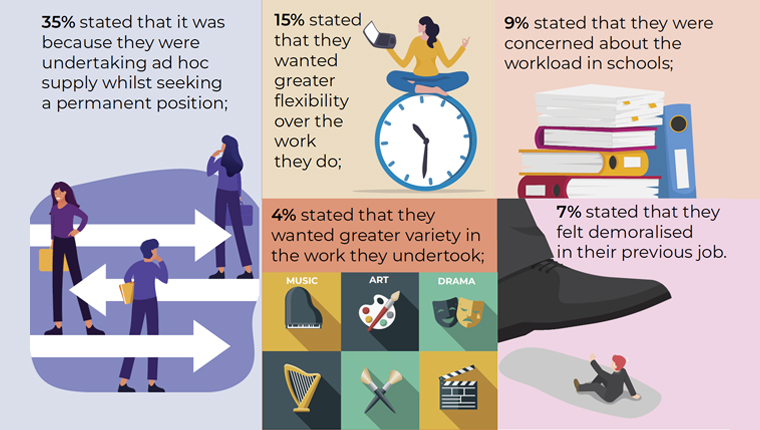
Cannot get a permanent job.
When asked what other advantages/disadvantages were associated with being a supply teacher, two fifths (40%) cited the lack of job security and 15% noted the ability to see how different schools work. Just under one in ten (8%) noted the fact that there was no marking and a further 8% noted the fact that there was no holiday or sick pay.
Supply teachers were asked about their ability to secure work teaching during the academic year 2023/24. Seventy-one per cent reported that they had no problems securing work, whereas a quarter (25%) reported that they had some problems securing work. Just under one in 20 supply teachers (4%) reported that they had significant problems getting supply work.
Bookings often amended/cancelled with little notice.
New NISTR platfrom causing problems.
Access to work
During the academic year 2023/24, just over two fifths of supply teachers (43%) reported that they were working for one school, 16% reported that they were working for two schools, and under one in ten (7%) reported that they were working for three schools. Just over one in 20 supply teachers (6%) reported that they were working for four schools and just under one in ten (7%) reported that they were working for five schools. Just over a fifth of supply teachers (21%) reported that they were working for more than five schools.
When asked if this was more or less than the number of schools they had worked for during the previous academic year, just under a quarter of supply teachers (24%) stated that it was more, just over a fifth (22%) stated that it was less, and well over half (54%) stated that it had stayed the same.
Just under a third of supply teachers (32%) reported travelling between 0-10 miles for an assignment, just over a third (34%) reported travelling between 11-20 miles, just over a fifth (21%) reported travelling between 21-30 miles, just under one in ten (9%) reported travelling between 31-40 miles for an assignment, and just under one in 20 (4%) reported travelling between 41-50 miles. Just under a fifth of supply teachers (18%) reported that they had to travel further than in previous years in order to secure work.
Just over half of supply teachers (52%) stated that the cost of living crisis had a detrimental impact on how far they were willing to travel to undertake an assignment.
With the short-term notices in NISTR, I had to be on my phone constantly to even be in with a chance of getting work which was difficult when teaching and very disheartening when I am not successful or don’t even get a response.
Availability of work
Supply teachers were asked where they were able to obtain work during the academic year 2023/24.
Well over two fifths of supply teachers (44%) who responded to the survey stated that they were able to secure work in primary schools, well over half (55%) stated that they were able to secure work in secondary schools, and just over one in ten (11%) reported that they were able to secure work in special schools/pupil referral units.
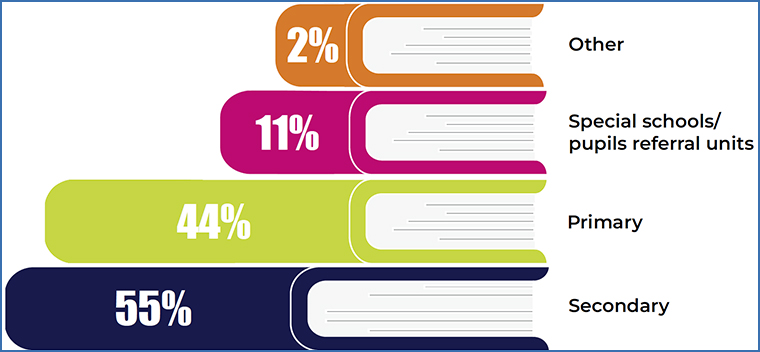
For those supply teachers who reported that they were able to secure work during the academic year 2023/24, just over a third (34%) reported that the majority of their supply teaching was short term supply (e.g. ad hoc for two days or fewer), just over one in ten (11%) said that this was weekly assignments, and one in 20 (5%) stated that this was monthly assignments. Just over one in ten supply teachers (11%) reported that the majority of their work was termly assignments and just under two fifths (39%) stated that the majority of their teaching was on longer term assignments in excess of a term.
When supply teachers were asked how many days on average they were able to obtain work during the academic year 2023/24, just over one in ten (12%) said they secured work one day a week, 14% two days a week, and just over a fifth (21%) three days a week.
Just over one in ten supply teachers (12%) said they were able to secure work for four days a week. Just over two fifths of supply teachers (41%) stated that they were able to secure work five days a week. However, just over four fifths (82%) said that they wanted to work between three to five days a week.
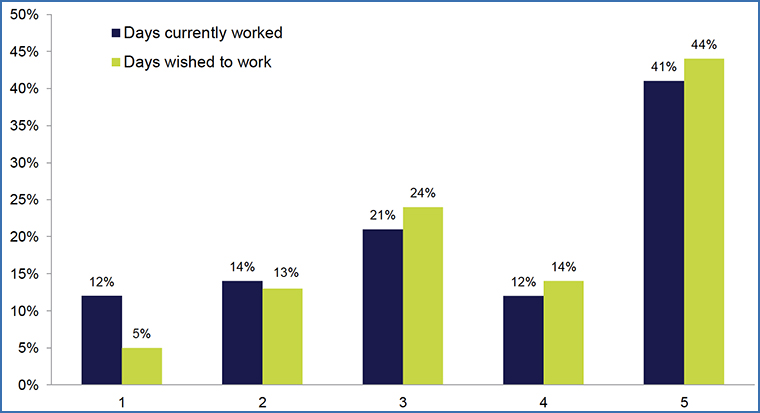
Seventeen per cent of supply teachers stated that the amount of supply work had decreased during 2023/24 when compared to the previous academic year, whereas 18% of supply teachers stated that the amount of supply work had increased. Just under two thirds of respondents (65%) stated that the amount of supply work they were able to secure had stayed the same.
I have consistently been booked for sub work every week.
Budget cuts means that, being an experienced teacher on UPS3, you are expensive and don’t get booked. Principals have actually said this to me.
Working for a school
Supply teachers were asked about their experiences working for a school during the academic year 2023/24.
Experiences with schools, staff, parents and pupils when undertaking assignments
Just under three fifths of supply teachers (59%) reported that they are always made to feel welcome by the school and just over a third (34%) stated that they are often made to feel welcome by the school. However, 7% stated that they are rarely made to feel welcome by the school.
When asked how welcome they are made to feel by the teaching staff in schools, just under two fifths of supply teachers (38%) reported that they are always made to feel welcome and well in excess of half (57%) reported that they are often made to feel welcome by the teaching staff in schools. However, one in 20 supply teachers (5%) stated that they are rarely made to feel welcome by the teaching staff in schools.
When asked how welcome they are made to feel by the support assistants in schools, well in excess of two fifths of supply teachers (45%) reported that they are always made to feel welcome and just over a fifth (22%) reported that they are often made to feel welcome by the support assistants in schools. However, a third of supply teachers (33%) stated that they are rarely made to feel welcome by support assistants in schools.
When asked how welcome they are made to feel by the administrative staff in schools, just over two thirds of supply teachers (67%) reported that they are always made to feel welcome and just over one in ten (11%) reported that they are often made to feel welcome by the administrative staff in schools. However, just over a fifth (22%) reported that they are rarely made to feel welcome by the administrative staff in schools.
When asked how welcome they are made to feel by the pupils in schools, a quarter of supply teachers (25%) reported that they are always made to feel welcome and just over two fifths (42%) reported that they are often made to feel welcome by pupils in schools. However, just under one in ten supply teachers (8%) reported that they are rarely made to feel welcome by the pupils and a quarter (25%) stated that they are never made to feel welcome by the pupils.
However, in respect of being made to feel welcome by the parents, three fifths of supply teachers (60%) stated that they are rarely made to feel welcome and two fifths (40%) reported that they are never made to feel welcome.
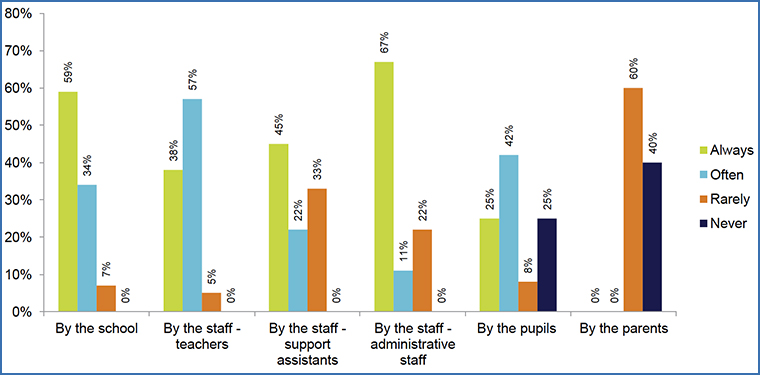
Just under a fifth of supply teachers (19%) reported that they had experienced physical abuse or violence from pupils when undertaking an assignment and well in excess of two fifths (46%) stated that they had experienced verbal abuse or violence from pupils when undertaking an assignment during the 2023/24 academic year.
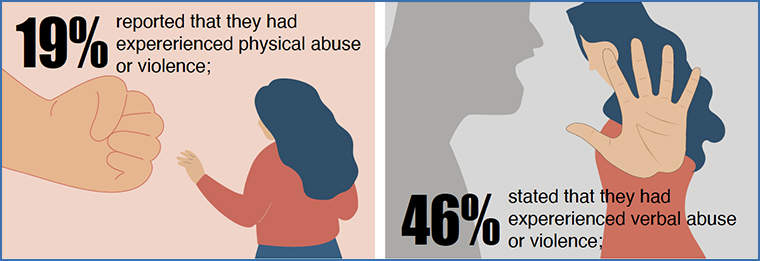
Just under nine out of ten supply teachers (88%) indicated that they had reported the incident/s to someone in the school; however, of those who did report the incident, just over a fifth (21%) stated that no action was taken against the pupil, and a further 21% stated that they didn’t know or were not informed whether or not any action was taken.
A child with issues coming into school kicked and punched me.
Continually [swearing]. With no support from staff at the school. Even had a member of SLT say to a pupil in front of me ‘don’t worry, he is on supply and won’t be in tomorrow.'
Provision of key information when undertaking assignments
Of those supply teachers able to secure work during the 2023/24 academic year, just under half (48%) stated that they were not given the school’s overall risk assessment and just under a quarter (23%) stated that they were not sure.
Just under a third of supply teachers (32%) stated that they were not given the arrangements in place for supply teachers to report safely to the workplace and three fifths (60%) stated that they were not given the details of any procedures and protective measures in regards to Covid-19, including any financial support available.
Just under two fifths of supply teachers (38%) stated that they were not provided with the details regarding access to, and availability of, hand sanitiser, and two fifths (40%) reported that they were not provided with the details in place to ensure classrooms and work areas were well ventilated.
Well in excess of one in ten supply teachers (14%) stated that they were not provided with the details of any designated contact(s) for any questions, problems or emergencies and just over one in ten (11%) reported that they were not given the details of who and where to report to each day, including details of the signing in process.
Twenty-nine per cent of supply teachers reported that they were not provided with the details of how to raise any concerns about health and safety, and just over a quarter (27%) reported that they were not provided with the details of how to call for assistance, including first aid. Furthermore, 47% of supply teachers reported that they were not provided with the details of the nearest first aid room or appropriate area.
In regards to the school’s fire evacuation plans, including routes and procedures, just under a third of supply teachers (31%) reported that this was not provided to them when undertaking assignments in schools during the 2023/24 academic year.
Twenty-nine per cent stated that they had not been given a tour of the school site, including identifying where they would be teaching when undertaking assignments in schools.
In respect to the timetable, including breaks and lunch periods, as well as expectations on staff during such times, just over one in ten supply teachers (12%) reported that information regarding this had not been provided to them when undertaking assignments in schools.
A fifth of respondents (20%) reported that they had not been provided with the details of the registration process and expectations for the appropriate movement of pupils around the school site between lessons, at breaks, at lunchtimes and at the end of the school day when undertaking assignments during the 2023/24 academic year.
In regards to teaching, 36% of supply teachers reported that they were not provided with details of how to access relevant information on schemes of work for the subjects they were expected to teach and just under a third (32%) reported that they had not been provided with access to relevant teaching materials.
I feel I have been supplied with adequate information from schools on arrival as a sub.
In addition, just under one in ten supply teachers (9%) stated that they were not provided with the details regarding access to computers, with login details and what to do at the end of the school day and over two fifths (42%) reported that they were not provided with the details of any resources they might reasonably be expected to provide to students, such as pens.
Just under a quarter of respondents (24%) stated that they were not provided with a list of the pupils in the class(es) they would be teaching, including details of any medical conditions, behavioural issues or special educational needs and disabilities (SEND) and half of supply teachers (50%) stated that they had not been provided with the details of any pupils known to be potentially violent and how this should be managed.
Furthermore, just over a quarter of supply teachers (27%) reported that they had not been provided with the behaviour management policy when undertaking assignments in schools, including who to contact.
A third of supply teachers (32%) reported that they had not been provided with the details of any events, meetings or specific activities taking place and 37% of supply teachers stated that they had not been provided with the arrangements for school transport, as appropriate, when undertaking assignments during the 2023/24 academic year.
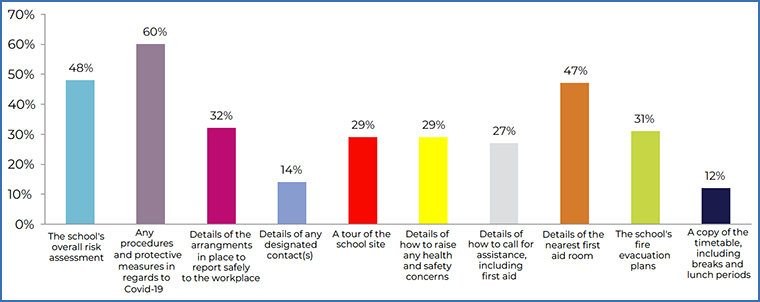
Very little given. A folder with scrappy bits of paper in. Logins that often didn’t work. No seating plans showing children with behaviour issues and SEN. No time to digest anything. Just sent to the first room and hope for the best.
Access to facilities and amenities in schools when undertaking assignments
When asked about their most recent assignment, 15% of supply teachers stated that they do not always have access to staff rooms where they are available, just under half (48%) stated that they do not always have access to staff food and drink facilities, and just under one in ten (9%) said that they do not always have access to toilet/washroom facilities. Fifteen per cent reported that they do not always have access to car parking.
Forty-eight per cent of supply teachers stated that they do not always have access to staff food and drink facilities when undertaking assignments
Issues and concerns, including health and safety, for supply teachers
Just under a fifth of supply teachers (18%) stated that they do not feel that any issues and concerns they have raised are taken seriously and under a quarter (23%) stated that they didn’t know.
A fifth of supply teachers (20%) who secured work during the academic year 2023/24 stated that they were concerned about their health and safety when undertaking supply work in schools and 3% of supply teachers thought that they may have been penalised or had work cancelled for disclosing personal information about their health and safety (e.g. pregnant).
Never taken seriously. You are there for a day/week/term and then you are gone. Those in SLT or power know this and pacify parents/pupils first with no regard to you or the fact that they are undermining you.
School I had most work from treated me the same as a permanent staff member.
Rates of pay for supply teachers
In respect of rates of pay, supply teachers were asked if they had been paid at the correct point on the teachers’ pay scale for the work they had undertaken during the academic year 2023/24.
Nine out of ten (90%) reported that they had been paid on the correct point on the teachers’ pay scale, but one in ten (10%) stated that this was not the case.
The schools will not pay to scale. MPS6 has been the highest. Should be on UPS3.
Just under a fifth of supply teachers (18%) reported that they have been offered work as a cover supervisor, teaching assistant or similar role and, where they have been offered these roles, just over three fifths (62%) reported that these were offered at a lower rate of pay than they would have been for teaching.
Financial situation
Supply teachers were asked about their financial situation during the academic year 2023/24.
Just under a third of supply teachers (32%) reported that they had sourced work elsewhere other than teaching during the academic year. Of those, just over four fifths (81%) stated that the work sourced elsewhere other than teaching failed to provide the same level of financial income that they would have obtained had they been able to obtain work teaching.
Just under one in ten supply teachers (9%) reported having to claim some form of state benefit during the academic year (e.g. Universal Credit) and over two fifths of respondents (43%) stated that they had experienced financial hardship as a supply teacher over the same period.
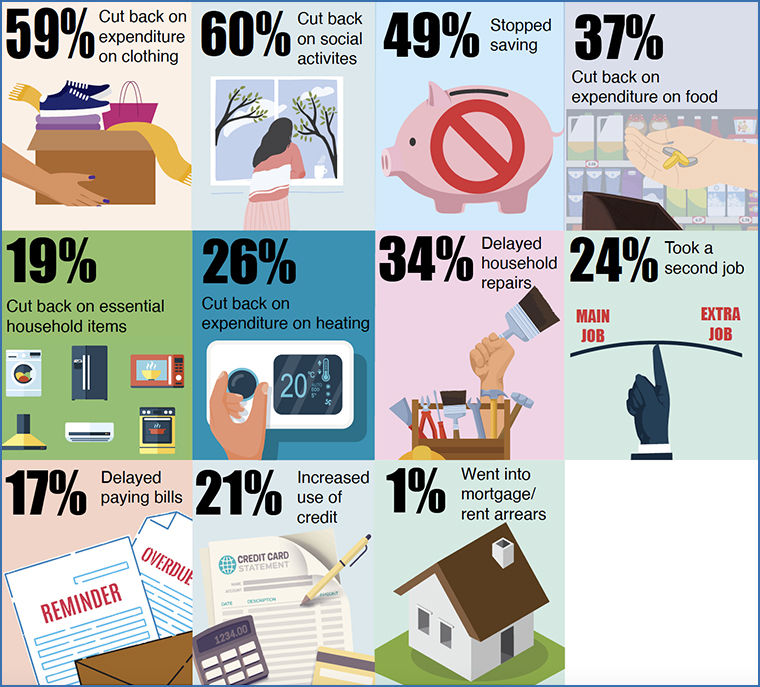
I am the only wage earner for the household. It’s hard to get temporary work over Easter/summer. Three kids in primary school to care for. As soon as the money comes in, it’s accounted for in bills, groceries and credit cards.
Using credit card to pay for basics, food, heating, gas and electric.
Forty-three per cent of supply teachers stated that they had experienced financial hardship
Over three quarters of supply teachers (76%) who responded stated that undertaking supply work and the inability to secure a permanent post, had affected their ability to make significant life decisions
I was very lucky to have lived with family during this time, especially during the two months I received no pay.
Training and behaviour management support
Just under half of supply teachers (49%) stated that they had not been given access to continuing professional development (CPD) in the last 12 months.
For those supply teachers who accessed CPD, just under two fifths (39%) stated that this had been provided by the education authority, just under two thirds (64%) stated that this had been provided by schools, 14% stated that this had been provided by their trade union, and just over one in 20 (6%) reported that it had been provided by a subject specialist organisations exam board.
Just under half of supply teachers (49%) stated that they had not been given access to CPD
In regards to participating in in service training (INSET) days provided by schools during the 2023/24 academic year, 29% of supply teachers reported that they were asked to participate in all the INSET days in schools where they undertook assignments, whereas just over one in 20 (7%) reported that the majority of schools asked them to participate in INSET days, and just under a fifth (18%) stated that a few schools asked them to participate in INSET days.
Well over two fifths of supply teachers (46%) reported that they were not asked to participate in any INSET days provided by the schools where they undertook assignments.
Fifteen per cent of supply teachers reported that they do not feel they are treated with respect and dignity
Not always. Some staff and pupils are really lovely and respectful. Others are not and have a terrible attitude towards supply teachers.
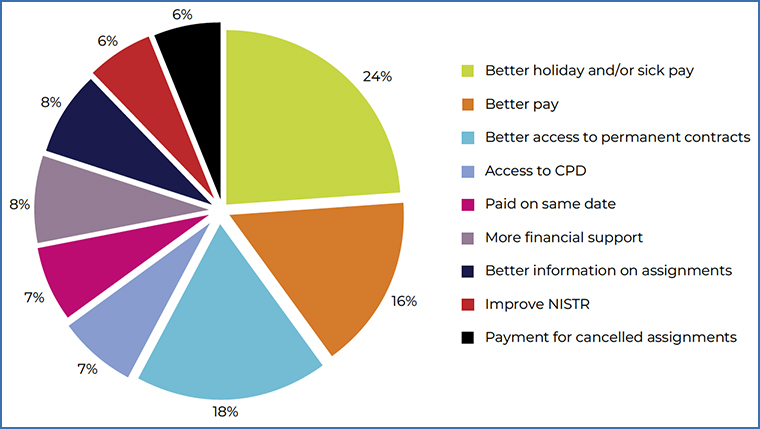
I am actively looking for a job that provides similar or better pay and benefits.
It has been a tough year for supply teachers.
Just over a third of supply teachers (35%) who responded stated that, based on their experiences during the 2023/24 academic year, they were currently looking for work outside of teaching
Conclusion
The survey of supply teachers emphasises the crucial role that supply teachers have played in schools in Northern Ireland during the 2023/24 academic year.
However, the survey suggests that the experiences of supply teachers throughout the 2023/24 academic year have been varied. For some supply teachers, the opportunities for work have increased, whereas others have found that they have been forced to travel further in order to secure work, despite the ongoing cost of living crisis.
Given the vagaries of intermittent and insecure employment, a number of supply teachers have had to make tough decisions about their expenditure, including cutting back on their expenditure on essential items such as food and heating. Some supply teachers have even been forced into mortgage/rent arrears.
In addition, some supply teachers have been forced to claim Universal Credit and there are those who have had to rely on the generosity of family and friends to make ends meet.
Furthermore, the 2023/24 survey indicates that many schools are still routinely failing to provide key information to qualified and dedicated supply teachers, including in regards to the pupils they are expected to teach, as well as critical health and safety information to enable them to discharge their duties safely.
There are concerns that these disparities in treatment are impacting disproportionately on women, Black and minority ethnic (BME) groups and disabled teachers, who are more likely to be employed as supply teachers.
In this context, the results from the 2023/24 survey substantiate the pressing need for a better deal for supply teachers which recognises and values the important and significant contribution they make to the education system in Northern Ireland.
The full survey report can be downloaded on the right/below.
